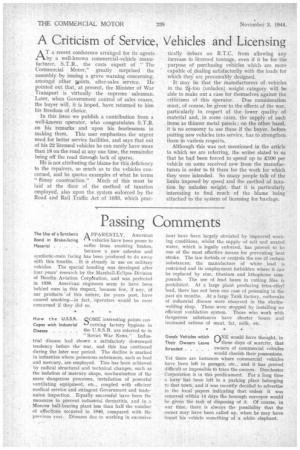A Criticism of Service, Vehicles and Licensing
Page 20

If you've noticed an error in this article please click here to report it so we can fix it.
AT a recent conference arranged for its agents by a well-known commercial-vehicle manufacturer, S.T.R., the costs expert of " The Commercial Motor," greatly surprised the assembly by issuing a grave warning concerning, amongst other points, after-sales service. He pointed out that, at present, the Minister of War Transport is virtually the supreme salesman. Later, when Government control of sales ceases, the buyer will, it is hoped, have returned to him his freedom of choice.
In this issue we publish a contribution from a well-known operator, who congratulates S.T.R. on his remarks and upon his fearlessness in making them. This user emphasizes the urgent need for better service facilities, and says that out of his 22 licensed vehicles he can rarely have snore than 18 on the road at any one time, the remainder being off the road through lack of spares.
He is not attributing the blame for this deficiency to the repairers, so much as to• the vehicles concerned, and he quotes examples of what he terms "flimsy construction." Much of this must be laid at the door of the method of taxation employed, also upon the system enforced by the Road and Rail Traffic Act of 1933, which prac tically debars an R.T.C. from allowing any increase in licensed tonnage, even if it be for the purpose of purchasing vehicles which are more capable of dealing satisfactorily with the loads for which they are presumably, designed.
It may be that the manufacturers of vehicles in the 2i-ton (unladen) weight category will be able to make out a case for themselves against the criticisms of this operator. Due consideration must, of course, be given to the effects of the war, particularly in respect of the lower quality of material and, in some cases, the supply of such items as thinner metal panels ; on the other hand, it is no economy to use these if the buyer, before putting new vehicles into service, has to strengthen them in various respects.
Although this was not mentioned in the article to which we are referring, the writer stated to us that he had been forced to spend up to £100 per vehicle on some received new from the manufacturers in order to fit them for the work for which they were intended. So many people talk of the limits imposed by speed and the method of taxation by unladen weight, that it is particularly interesting to find much of the blame being attached to the system of licensing for 'haulage.




















































